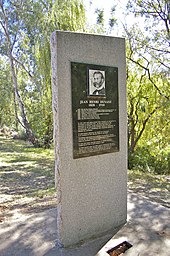1992年5月27日,維斯米其納廣場遭受到迫擊炮攻擊,一群在廣場上排隊買麵包的百姓受到波及,這場攻擊中,有22人死亡,七十多人受傷。斯梅洛維奇為了悼念死去的22人,便在事發地點連續22天演奏大提琴,演奏的曲目為阿爾比諾尼的G小調慢板。此舉受到全世界的注目。[1]
作曲家大衛·懷爾德(David Wilde)因此創作了「塞拉耶佛的大提琴家」這首大提琴曲子,此曲亦收錄在馬友友的專輯中。受到斯梅洛維奇啟發的創作還包括了民謠歌手約翰·麥克卡森(John McCutcheon)的「在塞拉耶佛街上」、加拿大作家伊莉莎白·威爾本(Elizabeth Wellburn)的童書「來自廣場的回聲」,還有亦為加拿大作家史帝芬·蓋洛威(Steven Galloway)以斯梅洛維奇的行動,寫成了小說「塞拉耶佛的大提琴家」,為2008年加拿大的暢銷書。
In his honour, composer David Wilde wrote a piece for solo cello, The Cellist of Sarajevo, which was recorded by Yo Yo Ma.
https://www.youtube.com/watch?v=HUwLbUdUYxo
------
Henry Dunant (born Jean-Henri Dunant; 8 May 1828 – 30 October 1910), also known as Henri Dunant, was a Swiss humanitarian, businessman and social activist. He was the visionary, promoter and co-founder of the Red Cross. In 1901 he received the first Nobel Peace Prize together with Frédéric Passy, making Dunant the first Swiss Nobel laureate.
1992年5月27日,維斯米其納廣場遭受到迫擊炮攻擊,一群在廣場上排隊買麵包的百姓受到波及,這場攻擊中,有22人死亡,七十多人受傷。斯梅洛維奇為了悼念死去的22人,便在事發地點連續22天演奏大提琴,演奏的曲目為阿爾比諾尼的G小調慢板。此舉受到全世界的注目。[1]
作曲家大衛·懷爾德(David Wilde)因此創作了「塞拉耶佛的大提琴家」這首大提琴曲子,此曲亦收錄在馬友友的專輯中。受到斯梅洛維奇啟發的創作還包括了民謠歌手約翰·麥克卡森(John McCutcheon)的「在塞拉耶佛街上」、加拿大作家伊莉莎白·威爾本(Elizabeth Wellburn)的童書「來自廣場的回聲」,還有亦為加拿大作家史帝芬·蓋洛威(Steven Galloway)以斯梅洛維奇的行動,寫成了小說「塞拉耶佛的大提琴家」,為2008年加拿大的暢銷書。
In his honour, composer David Wilde wrote a piece for solo cello, The Cellist of Sarajevo, which was recorded by Yo Yo Ma.
https://www.youtube.com/watch?v=HUwLbUdUYxo
------
Henry Dunant (born Jean-Henri Dunant; 8 May 1828 – 30 October 1910), also known as Henri Dunant, was a Swiss humanitarian, businessman and social activist. He was the visionary, promoter and co-founder of the Red Cross. In 1901 he received the first Nobel Peace Prize together with Frédéric Passy, making Dunant the first Swiss Nobel laureate.
Henry Dunant, the founder of the International Red Cross, was the very first person to receive the Nobel Peace Prize.
Dunant was a passionate humanitarian but failed in his business affairs - people who had invested in his projects lost their money. This made him so unpopular that in 1867 he resigned as Secretary of the Red Cross (ICRC) and left Geneva, never to return.
More than 20 years later, Dunant was found in a small Swiss village. For many years he had lived as a beggar and slept outdoors. After being 'rediscovered', he received various prizes and awards, including the very first Nobel Peace Prize.
When he died in 1910, Dunant was buried without any ceremony in accordance with his wishes. He had not spent any of the Nobel Prize money he had received and left most of it to charities.
Learn more about Dunant: https://bit.ly/33M9vJf
286286
6則留言
47次分享
讚
留言
分享



沒有留言:
張貼留言